Editor’s note: Listen to these speeches in full at edwilson.wfu.edu.
‘The Heritage of Wake Forest’
Excerpts from Ed Wilson’s speech delivered at
the original campus on March 30, 1996
—–
AFTER ALMOST forty years the memory has not faded. I walk across this beautiful campus and into this wonderful and so friendly town, and once again I am sixteen, seventeen, eighteen, nineteen, twenty years old, full of hope and expectation, rejoicing in the day and in the company of colorful and faithful friends. Everywhere I look, my imagination stirs.
There, by the Old Well, in the twilight hours of a spring evening, I lie on the grass, listening to the sounds of a Beethoven Symphony coming from an upper room of Wait Hall, where Thane McDonald has placed on the music department’s turntable a set of worn 78 rpm records. Never again will Beethoven seem more alive or more powerful.
Over yonder in the Social Science Building, in the hall outside the College Book Store, three or four students gather to watch Connecticut Yankee John Conley serve a ping pong ball to an already defeated opponent, giving with his paddle such a twist to the ball that every time, seemingly, the ball hits the very rim of the opposite side of the table. Around the corner, inside the store, Everette Snyder or one of the Cole brothers serves up a “black cow,” and I wander to a rack of newly created PocketBooks, where James Hilton’s “Lost Horizon” and Pearl Buck’s “The Good Earth” are available for twenty-five cents apiece. At a nearby table four Lambda Chis get ready for yet another hand of bridge.

In the rotunda of Wait Hall, a place of unexpected grace and beauty, Thurman Kitchin or D.B. Bryan or Elliott Earnshaw or Grady Patterson looks out from his office to say hello. These are all quiet and gentle men who seem not to have heard of pomp and circumstance. They speak, in an unhurried way, of enrollments and budgets — and, maybe, golf. Edith Earnshaw, one of the gallant Taylor sisters, comes out of the Bursar’s office, bringing to the group of men a welcome touch of poetry.
On the “bumming” corner by Miss Jo’s I take my place among the students waiting for a ride to Raleigh. Maybe I am tenth or fifteenth in line, but I know that eventually a car will stop. We are, after all, on U.S. Highway No. 1, and the traffic is steady. It is beginning to snow. I am going to the State Theatre in Raleigh for the Wake County premiere of “Gone with the Wind” and, afterwards, I will have Chinese food at the Canton Restaurant on Hillsborough Street.
Across the street from the place where Faculty Avenue meets the rock wall on the north side of the campus is a brick building where Mrs. Newsome’s boarding house staff serves meat, vegetables, desserts, and iced tea — all of excellent quality — to a dining room full of students. Music is being played while we wait for the meal: “Moonlight Serenade,” “Star Dust,” “I’m Getting Sentimental Over You,” “In the Mood,” “My Prayer is to linger with you / at the end of the day / in a dream that’s divine.” The songs all speak wistfully of romantic love on this all-male campus, and we look ahead to that rare weekend in Raleigh or Durham when, for a change, we will not be alone.
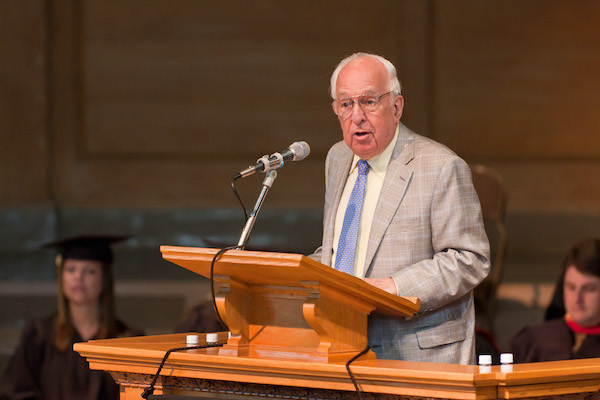
The first home football game of the season is about to begin, and I join hundreds of students coming out of Bostwick and Hunter to make their way past the Gymnasium down the little street that leads toward Gore Field. Even by the standards of 1939, the setting is not impressive — seats built into the sides of a hill, no amenities, no hotdogs, not even (I think) an announcer — but the spirit is contagious and cleansing, and Wake Forest wins. By chance I walk home with Phil Utley, my physical education teacher, who will later that year try — in vain — to show me how to use the parallel bars.
Every day I go to the Post Office, down the steps that cross the railroad tracks, past Mr. Brewer’s store, and into the center of town. If I am hungry, I stop — out of deeply engrained habit — at Shorty’s for a nickel hamburger. I take a look at the posters in front of the Collegiate Theatre, cross the street to look at what’s happening at the Forest Theatre, stop at the College Soda Shop to say hello to Fred or Ben or “Smut,” and at the post office (in later years) am greeted from the service window by Lib Greason, who apparently knows us all. On the way back, I may get a haircut from Barney Powell, buy a tube of toothpaste from Tom Holding, cash a check at Mr. Satterwhite’s bank, or linger at Hardwicke’s Drug Store to watch a train go by. Beyond the tracks appears the arch, gateway to the campus, a familiar invitation to learning.
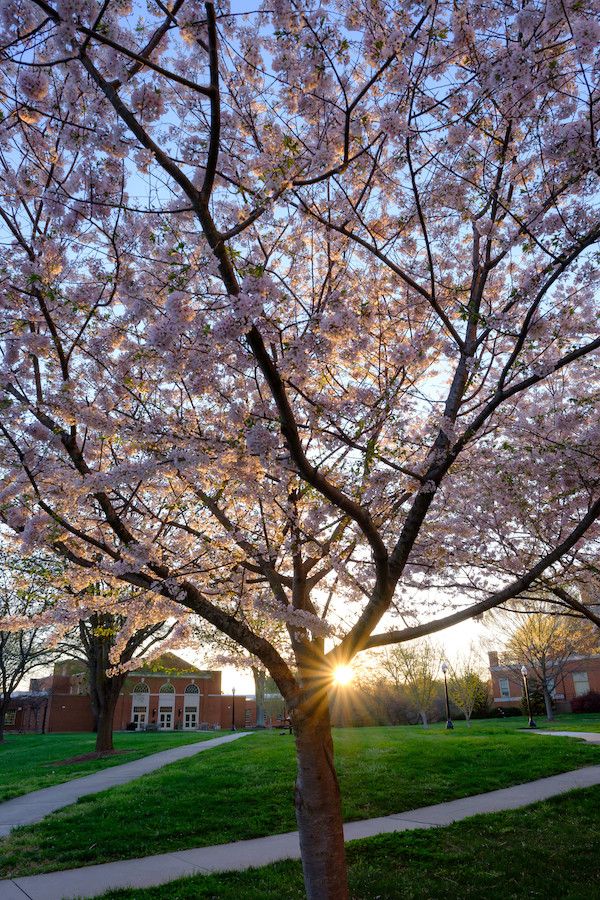
On one of those Sundays when I wake up in time, I attend services at the Baptist Church. The speaker is Everett Gill, a returned missionary from Eastern Europe. His text is the parable of the Good Samaritan, and he likens the man who fell among thieves to the many Europeans now being killed by the Nazis. America should be the Good Samaritan, he says. It is a role we are not yet ready for, but when December 7, 1941, arrives, and Bob Lide comes running up the steps at Mrs. Richard Brewer’s house to tell us about the attack at Pearl Harbor, we understand what Dr. Gill had meant. A year later, on another December day, I go to Raleigh — this time on a bus, for I wish to remain neatly dressed — to join the Naval Reserve. My last term as a Wake Forest undergraduate is about to begin.
——-
THE BRITISH ESSAYIST G.K. Chesterton once said that half of education is “atmosphere.” Well, we at Wake Forest had “atmosphere,” and it enveloped the whole community — created not out of wealth or possessions or social standing but out of simple trust, good will, camaraderie, and a sense of belonging. At our best we reached not outward for what the world might give us but inward for what we might find within ourselves to give the world. In this place, comforting and challenging, we absorbed — almost, as it were, from the air — both friendship and purpose.
——-
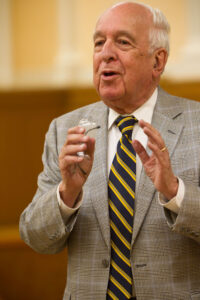 AND SO TODAY we celebrate the heritage of Wake Forest: discipline and passion, friendship and imagination, wisdom and hope and faith. We remember who we were “once upon a time,” and we honor those who helped and inspired us. But we do not live in memories. The present — and the future — are still ours, at least for a while. The gift of Wake Forest is not the courses we took or the degrees we received or even the pleasures of these reunion recollections. Nor is the gift of Wake Forest limited to this campus, however hallowed, or to us “old campus” alumni, however loyal. Wake Forest is not a place or a generation. It is an idea, an ideal, and it is to this idea, this ideal, in its transcendence, that we commit ourselves. To remember the Wake Forest that we knew is to remember youth and joy and freedom, and to continue to love Wake Forest is to honor youth and joy and freedom where they most often reside: that is, in the young and the joyful and the free. College is, then and now, for the young. We were young once; others are young now. Together — in union and in friendship — let us with them, today and in the years to come, sing of Wake Forest as we have always sung of Wake Forest:
AND SO TODAY we celebrate the heritage of Wake Forest: discipline and passion, friendship and imagination, wisdom and hope and faith. We remember who we were “once upon a time,” and we honor those who helped and inspired us. But we do not live in memories. The present — and the future — are still ours, at least for a while. The gift of Wake Forest is not the courses we took or the degrees we received or even the pleasures of these reunion recollections. Nor is the gift of Wake Forest limited to this campus, however hallowed, or to us “old campus” alumni, however loyal. Wake Forest is not a place or a generation. It is an idea, an ideal, and it is to this idea, this ideal, in its transcendence, that we commit ourselves. To remember the Wake Forest that we knew is to remember youth and joy and freedom, and to continue to love Wake Forest is to honor youth and joy and freedom where they most often reside: that is, in the young and the joyful and the free. College is, then and now, for the young. We were young once; others are young now. Together — in union and in friendship — let us with them, today and in the years to come, sing of Wake Forest as we have always sung of Wake Forest:
Thine is a noble name;
Thine is a glorious fame,
Constant and true.
We give thee of our praise,
Adore thine ancient days.
Sing thee our humble lays,
Mother, so dear.
‘To Honor the Legacy’
Excerpts from Ed Wilson’s speech delivered at Founders Day convocation on Feb. 6, 1992
——-
FOR ME — in 1939 — coming to Wake Forest, registering, and going to my first classes were, in the immortal words of Humphrey Bogart in “Casablanca,” the “start of a beautiful friendship.” Except for three years in the Navy and four years in graduate school, I have lived nowhere else, and the “beautiful friendship” has endured. I cannot pretend that every student, every teacher, every person working here has found at Wake Forest the “friendship” I have found. Some have instead experienced loss and disillusionment and, whether they have remained here or left, been deeply skeptical about Wake Forest’s proclaimed good intentions. Some of you in this Convocation audience may understandably dismiss my praise of Wake Forest as the natural, self-centered response of one student-teacher-administrator who is being especially honored today and who must therefore be thankful.
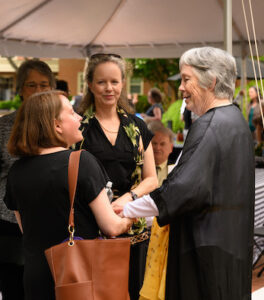
Emily Herring Wilson, far right, greets guests after the memorial service on May 3.
I will admit to being thankful. Thankful for more than forty-five happy years at Wake Forest. Thankful because it was on this campus, just a few minutes away from where I now stand, that I met the winsome and talented — and forthright — young woman who became my wife. Thankful because my much-loved three children were born and grew up here. Thankful because I learned at Wake Forest to embrace those certainties that John Keats proclaimed: “the holiness of the heart’s affections, and the truth of Imagination.” Thankful, especially, today to President Tom Hearn and to the Wake Forest Trustees for giving my name to one of the most creatively beautiful University buildings I have ever seen. Thankful because that building is a library, and because books have been the intellectual center of my life, and because they are, for me, not only the center of the university but also, in Emily Dickinson’s words, the chariots that, more than any other instruments of our imagination, “bear the Human soul.”
But my thankfulness today is not circumstantial. The events of this day, however heart-warming, are illustrative of what I have found at Wake Forest ever since my first registration day in September 1939.
——-
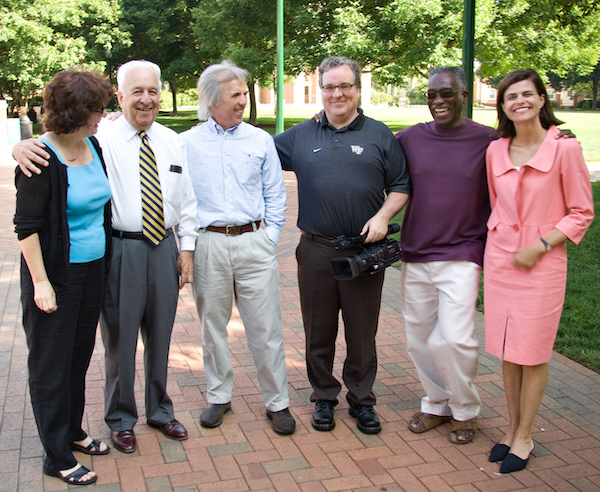
——-
THE GENIUS OF Wake Forest, I believe, has been created in the particular environment in which we have sought and transmitted intelligence and in which we have exalted man and woman “thinking.” From our “founding” we have been a place which has honored teaching — teaching defined not only through the familiar processes of lecture and seminar and laboratory but through those conversations between teachers and students, in and after hours, which bring to the developing mind illumination and insight and a new, unfolding awareness which is a kind of joy.
Listen to the speech in full and read a transcript
‘The Essence of Wake Forest’
Excerpts from Ed Wilson’s speech delivered at the University’s Summer Leadership Conference in July 2010
——-
TODAY, “PRO HUMANITATE” is still Wake Forest’s much cherished motto, and the original interpretation is still being heard by some who wish
to “proclaim” the good news of the Gospels, but it is no longer for most Wake Foresters an invitation to proclaim and to convert. Rather it tells us to be friends to all humanity with honor, to teach, to help, to serve. And nothing is more encouraging to me than to know students and alumni who hear the words “Pro Humanitate” and then, with friendship and honor, put those words into practice.
As we look to the future, I hope that we will remember “friendliness” and “honor” and “Pro Humanitate” as cornerstones of what I think of as the uniqueness of Wake Forest as a university. I do not like to talk about “peer institutions,” and may I say that for me national rankings of universities are invariably shallow and partial and not to be trusted. Wake Forest really has no “peers.” There is no other school quite like us. We stand alone. We are what we are. We do not exist in relation to other schools; we succeed or we fail only in so far as we are true to our commitments, to our own ambitions, to our own destiny, to friendship and honor.
——-
BECAUSE I HAVE talked at length about friendliness and honor and may seem to have ignored the academic purposes, which, after all, give substance to a university, I want to end with a tribute to learning itself. It comes from T.H. White’s “The Sword in the Stone,” a retelling of the legend of King Arthur. (You may have read it when you were a boy or a girl.) The wise old magician Merlin is giving his student, the once and future King Arthur, some farewell advice about how he should use his time.
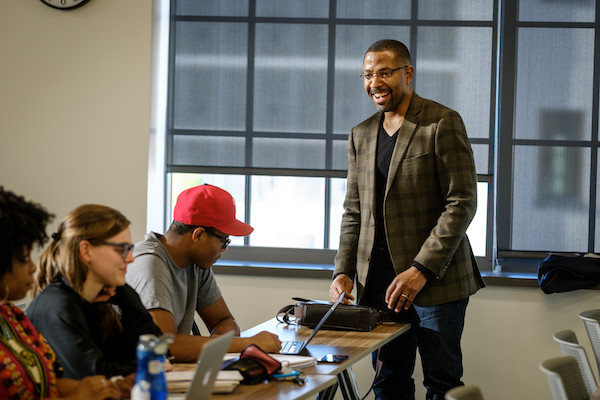
“The best thing,” says Merlin, “is to learn something. That is the only thing that never fails. You may grow old and trembling … you may lie awake at night … you may miss your only love, you may see the world about you devastated by evil lunatics, [you may see] your honor trampled in the sewers of baser minds. There is only one thing for it then — to learn. … That is the only thing which the mind can never exhaust, never alienate, never be tortured by, never fear or distrust, and never dream of regretting. Learning is the thing for you. Look at what a lot of things there are to learn — pure science, … astronomy … , natural history … , literature, … biology and medicine and [religion] and geography and history and economics.” And Merlin continues. At the end of his discourse Merlin says to the young and future King Arthur, “Do you think you have learned anything?” To which Arthur replies, “I have learned and been happy.”
My hope for each graduate of the Wake Forest of our future is that he or she, if asked the question on Commencement Day, “Do you think you have learned anything?” will be able to say “I truly love what Wake Forest stands for. I have made friends, I have conducted myself with honor, I have learned, and I have been happy.”
Watch Ed Wilson read the speech


